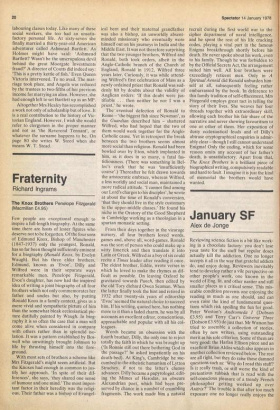Fraternity
Richard Ingrams
The Knox Brothers Penelope Fitzgerald (Macmillan E4.95) Few people are exceptional enough to inspire a full-length biography. At the same time there are hosts of lesser figures who deserve not to be forgotten. Of the four sons of Edmund Knox, Bishop of Manchester (1847-1937) only the youngest, Ronald, has so far been thought sufficiently eminent for a biography (Ronald Knox, by Evelyn Waugh). But his three elder brothers, Edmund, known as 'Evoe', Dilly and Wilfred were in their separate ways remarkable men. Penelope Fitzgerald, Evoe's daughter, has now had the inspired idea of writing a joint biography of all four brothers which not only commemorates her father and uncles but also, by putting Ronald Knox in a family context, gives us a more vivid and sympathetic picture of him than the somewhat bleak ecclesiastical picture dutifully painted by Waugh. In biography it is so often the case that a man will come alive when considered in company with others rather than in splendid isolation. It was a pattern established by Boswell who unwittingly brought Johnson to life by thrusting himself into the foreground.
With most sets of brothers a scheme like Mrs Fitzgerald's might seem artificial. But the Knoxes had enough in common to justify her approach. 'In spite of their differences', she says, 'they shared one sense of humour and one mind.' The most important factor in their heredity was the religious. Their father was a bishop of Evangel
ical bent and their maternal grandfather was also a bishop, an unworldly absent minded missionary who eventually wore himself out on his journeys in India and the Middle East. It was not therefore surprising that the two younger brothers, Wilfred and Ronald, both took orders, albeit in the Anglo-Catholic branch of the Church of England, Ronald in 1912, Wilfred three years later. Curiously, it was while attending Wilfred's first celebration of Mass as a newly ordained priest that Ronald was suddenly hit by doubts about the validity of Anglican orders: 'If this doubt were justifiable . . . then neither he nor I was a priest,' he wrote.
The • eventual defection of Ronald to Rome — 'the biggest fish since Newman', as the Guardian described him — shattered Wilfred, who had hoped that the two of them would work together for the AngloCatholic cause. Yet in retrospect the break between the two brothers seems almost more social than religious. Ronald had been bowled over by Eton, which implanted in him, as it does in so many, a fatal fastidiousness. (There was something in Belloc's crack that he was 'insufficiently coarse'.) Thereafter he felt drawn towards the aristocratic embrace, whereas Wilfred, a less worldly and social man, maintained a more radical attitude. `I cannot find among our Lord's charges to his disciples', he wrote at about the time of Ronald's conversion, `that they should live in the style customary to the upper-middle classes.' He found his niche in the Oratory of the Good Shepherd in Cambridge working as a theologian in a spartan monastic setting.
From their days together in the vicarage nursery, all four brothers loved words, games and, above all, word-games. Ronald was the sort of person who could make up a witty limerick and then translate it into Latin or Greek. Wilfred as a boy of six could recite a Times leader after reading it once. The eldest brother, Eddie, wrote verses in which he loved to make the rhymes as difficult as possible. On leaving Oxford he gravitated towards Punch, then edited by the old Tory diehard Owen Seaman. When the latter finally took the hint and retired in 1932 after twenty-six years of editorship 'Evoe' seemed the natural choice to succeed him. If his writing, quoted here, has nothing more to it than a faded charm, he was by all accounts an excellent editor, conscientious, approachable and popular with all his colleagues.
Words became an obsession with the fourth brother, Dilly, the only one to reject totally the faith in which he was brought up Os Ronnie still out there bothering God in the passage?' he asked impatiently on his death-bed). At King's, Cambridge he suc cumbed to the atheistic humanism of Lytton Strachey, if not to the latter's clumsy advances. Dilly became a papyrologist, edit ing the Mimes of Herodas, an obscure Alexandrian poet, which had been preserved by chance in a number of crumbling fragments. The work made him a natural
recruit during the first world war to the cipher department of naval intelligence, and he spent the rest of his life cracking codes, playing a vital part in the famous Enigma breakthrough shortly before his death. He never spoke about his work, even to his family. Though he was forbidden to by the Official Secrets Act, the arrangement suited him well. All four brothers were exceedingly reticent men. Only in A Spiritual Aeneid did Ronald unburden himself at all, subsequently feeling rather embarrassed by the book. In deference to this family tradition of self-effacement, Mrs Fitzgerald employs great tact in telling the story of their lives. She weaves her four threads together with extraordinary skill, allowing each brother his fair share of the narrative and never showing favouritism to one or other of them. Her exposition of dusty ecclesiastical feuds and of Dilly's abtruse cryptographical enquiries is admirably clear — though I still cannot understand Enigma! Only the ending, which for some reason omits any account of her father's death, is unsatisfactory. Apart from that, The Knox Brothers is a brilliant piece of biographical writing, compulsively readable
and hard to fault. I imagine it is just the kind of memorial the brothers would have wanted.






























 Previous page
Previous page